Kubrick: Barry Lyndon part 1
At the request of absolutely no one, but on the occasion of Criterion’s release of their edition of Kubrick’s 1975 costume drama, I’ve decided to sit down and try to tackle this most perplexing and misunderstood of Kubrick’s movies.
WHAT DOES THE PROTAGONIST WANT? Redmond Barry, as he is known in the first half of the movie, is torn between two conflicting desires. At the one end is “love,” which he desires strongly, and at the other end is “social mobility,” which, as life inflicts itself upon him, he gradually comes to desire more and more.
Kubrick lets us know, before the movie even starts, that his subject here is social mobility. A title card announces that the first half of the movie will tell us how Redmond Barry, local nobody, gradually comes to be known as fabulously rich guy Barry Lyndon. As the narrative unfolds, we see how the conflicting impulses of love and social mobility come to define Barry’s journey, and how the ever-present threat of violence serves as a kind of lubricant for both desires.
SCENE 1: The narrator tells us that Redmond Barry’s father was a lawyer who was killed in a duel regarding some horses. Kubrick plays the entire dual as something happening in the far distance. Barry’s father doesn’t get a close-up or even a two-shot: he’s a dot on the landscape.
And what a beautiful landscape! Barry Lyndon teems, brims, boils over with astonishing, gorgeous shots of rolling hills, pastures, groves, gardens and estates. The compositions deliberately recall paintings of the era, both to accustom the viewer to the vocabulary of the narrative (things don’t move here as quickly as they do in other movies, the characters often seem almost trapped in amber) and to let us know that the people in those paintings, who have been reduced in our minds to blobs and swirls of paint, had lives and loves, hopes and fears. It’s a daring directorial gambit, and for a lot of people it makes Barry Lyndon a static, boring viewing experience.
Me, I find it electrifying. The idea of starting with a man’s death, but showing it in the far distance, sets the narrative tone for the whole movie. There is great passion and feeling in every second of Barry Lyndon, but it almost always plays out under a thick layer of distancing devices. The juxtaposition of the placid surface of the images and the turmoil in the characters’ lives creates a sometimes almost unbearable tension.
This might be a good time to mention that, of course, one never truly makes a genuine “period drama.” Kubrick certainly goes to great lengths to drench Barry Lyndon in period atmosphere and detail, but, as with any period drama, the real subject is the day the movie is released. In a mediocre period drama, you see the concerns of the year the movie was made. In a sublime period drama, and Barry Lyndon is about as sublime as it gets, the concerns of the drama are so universal and well-presented as to keep the viewing experience fresh, contemporary and still bracing and thrilling 40 years after its release.
So the first scene of Barry Lyndon presents an act of violence, as seen from afar. “Violence, as seen from afar” could easily be a subtitle for Barry Lyndon. Violence, we could say, is Kubrick’s subject – why it exists, why it is perpetuated, what it is used for at every level of societal organization.
SCENE 2. After seeing Redmond’s father killed, we now meet his mother, in a wordless scene where she strolls through her rustic farmyard with a male suitor. The narrator informs us that Redmond’s mother rejected all suitors (including this one, I suppose) and lived her life in the memory of her sainted husband.
In a bad script, a narrator tells us what we’re seeing. In Barry Lyndon, the narrator tells us what we’re not seeing. Part of the vocabulary of Barry Lyndon is that the acting is, generally speaking, tamped way down, the actors frozen in place, held in place, we might say, by forces beyond their control. The characters do what they do because it is their destiny. The narrator, in a gently mocking tone, looks at the characters as one might look at one’s wayward child. They’re foolish and vain, the narrator says, but he loves them, because they’re so human. The fact that the narrator is often way ahead of the story, and tells us so, helps give the impression that the characters in Barry Lyndon, for all their hopes and desires, never really have any choice in the matters of their lives. The narrator is a kind of God, moving the characters around like chess pieces, watching the game play out the only way it can.
What else does this brief scene do? Well, it goes a certain distance toward explaining Redmond’s class. His mother has a farm, we see, or lives on one anyway. Or, if not a farm, at least a house with chickens and a stable. (Later we’ll learn that she’s living on a relative’s estate.) There was real, dire poverty in Ireland in the mid 1700s, but Mrs. Barry isn’t poor, not really. She doesn’t have “property,” which we’ll soon see is important, but she’s not living in squalor.
SCENE 3. So now we meet Barry, in a scene the narrator brands “First Love.” This is how Redmond Barry enters the world of the movie: hopelessly, stupidly in love with his cousin Nora Brady, playing a card game, which eventually is revealed as a sort of mild form of Strip Poker, in the seashell-bedecked garden house on the Brady estate. It’s worth noting that Barry loses this game of “Killarney,” thus allowing the oversexed Nora to have her way with him. Barry will, we will see, lose both his game of cards with Nora and lose Nora. But he will remember that cards can be used to get you things you want, especially — and this is important — if you cheat.
What does Barry want in this first act of the narrative? He is genuinely in love with Nora. Nora seems older, savvier, and more experienced than Barry, and, on this rainy afternoon in the garden house, would love to get Barry’s hands on her. Barry, being young, in love and terrified, can’t bring himself to pull the trigger on lust. Nora bares her cleavage, then hides a ribbon inside it and demands Barry fetch it out. When he tremblingly refuses, she forces his hand, literally. The poor dope, clearly at sea in matters of sex, must be taken in hand by the more experienced Nora.
So we could say that this is Barry in his purest state, before life comes crashing in to ruin everything. To Barry, if his life was spent in this garden house with Nora on this rainy afternoon, he’d count himself gloriously fulfilled. He does not wish for social mobility here, only for Nora’s warm, no-doubt fragrant bosom.
Again: we have to listen to the narrator to discern a lot of what Barry is feeling, because, based on the action onscreen, Barry seems stoic, almost robotic in his emotions. Barry Lyndon is, on a certain level, about emotions not expressed.
(The narration, you may be surprised to learn, is not from the novel, which is written in first person by Barry himself. Reading the novel, one quickly sees the distance between the rollicking prose of Thackery and the icy, frozen world of Kubrick. So, while Kubrick may stick more or less to the plot of the novel, Barry Lyndon is very much a Kubrick story.)
SCENE 4. The British come to Barry’s corner of the world. The narrator informs us that “all the kingdoms are in a state of great excitement” about the promise of an impending war. And we see the excitement on display here, as a regiment goes about a training demonstration for the local townsfolk. The use and purpose of the military is, of course, an important subject for Kubrick (who, after all, really wanted to make a movie about Napoleon instead of this one), and here we see the military used as a tool of seduction. Just as Nora prompted Barry’s excitement in the previous scene, now this regiment, captained by one John Quin, prompts Nora’s excitement. The military, with its smart red uniforms and precision drills, are presented as what passes for sexy in this county: powerful, orderly and, perhaps most important, worldly. This scene of seduction gets an exclamation point with, what else, a presentation of arms fired into the air, to make the boys envious and the girls jump.
SCENE 5. Wasting no time, we see that Nora has set her sights on Captain Quin. They dance after the regimental demonstration, and we’re reminded that dance, in this context, is a form of courtship, a codification, or a prelude, of sex.
SCENE 6. Barry walks Nora home through a copse of trees, and confronts her, jealously, about her flirting with Quin. Nora insists there is nothing going on between her and Quin, but, as we’ll see, Nora is an incredible liar.
Dumb as a post but still pure in heart, Barry insists that he will fight Quin for the sake of Nora’s love. We’re given a hint that Barry has been something of a ruffian around town, not an Alex De Large perhaps, but good with his fists. It’s hard to believe, watching Barry as we’ve seen him so far: he seems not merely placid but screwed in place. In any case, Nora reminds him that Quin is an army captain and is, therefore, presumably, better at fighting than Barry. What’s more, Quin has a salary of “1500 a year,” while Barry “hasn’t a guinea to his name.”
And so we see the first flickering of Barry’s competing desires. With a little social mobility, he might win the heart of the fair Nora, and thus be happy. Lacking social mobility, however, he’s perfectly willing to use violence.
So again, love, social mobility and violence circle around each other in Barry’s mind. When one wants love, one can get it (he thinks) by one or the other. So pure is his intent, he, of course, doesn’t think anything through. Fight Captain Quin? And then what? After he’s beaten Quin, will that get him what he wants? It never enters Barry’s mind that there’s anything beyond his all-consuming desire for Nora.
SCENE 7. Barry, rejected by Nora, chops some wood in the barnyard, with great exertion. Again, violence is never far from the picture in the serene world of Barry Lyndon, and it’s not hard to imagine that Barry is thinking of Captain Quin’s face as he brings the axe down on the log.
SCENE 8. Nora makes time with Quin outside the family home. Nora insists, in flowery language, that Quin he is the first man she has ever loved. Quin eagerly gobbles up this line of nonsense, and we learn how important this relationship is, not just to Nora but to her family. Plans have, apparently, been afoot for some time to marry Nora off to Quin, who has the power to forgive Nora’s family debts.
By now we know that Nora is far more “mature” than Barry, but in this case, “maturity” means “using the language of love to achieve social mobility.” Quin has something Nora wants, and Nora, presumably, has something Quin wants, and so a transaction is taking place. (Quin cannot see how much of a liar Nora is; she must flatter him quite effectively. She is not a great beauty and her family is of a much lower status than Quin’s; what does she have to offer him but self-delusion?)
Barry is having none of it. He enters the conversation and pitches a fit. He gives Nora back the ribbon she demanded he fetch out of her bosom, and Quin realizes he’s been played for a fool. This is a disaster for Nora and her family as Quin stomps off to pout.
SCENE 9. Some time later, the Brady family gathers for dinner. Things have been patched up between Nora and Quin, who announce their engagement. Nora, it seems, has found something she’s good at, and Quin seems to be very much an idiot, or at least incredibly susceptible to flattery.
Barry reacts to Quin’s announcement by throwing a glass in his face. Again, when love is on the line, and social mobility at stake, Barry’s only recourse is violence. Another way to put it is, Quin represents one level of violence (that of state against state) while Barry represents a highly personal level of violence, one that Quin doesn’t seem to be prepared for. He recoils as though poleaxed. Startled and horrified by Barry’s outburst, he, again, threatens Nora’s family and demands that Barry be punished. “I’m an Englishman and a man of property!” he splutters, thinking his social status should protect him from this kind of violence. Later, we’ll see how social status, in this narrative, is nothing but a scam, created specifically to protect the wealthy from the poor.
Barry, seeing his advantage, the only advantage he has, challenges Quin to a duel. He may lose at love and have no social status, but he believes himself to be good at violence, the equalizer in his world.
SCENE 10. Barry walks home, escorted by Captain Grogan, who works in the regiment alongside Quin. Although it’s never stated, we can see by his bearing (and his Irishness) that Grogan is not of Quin’s social standing. Perhaps Grogan has come by his rank more honorably, through skill or leadership.
He chastises Barry for ruining his life over Nora. The Bradys, he says, have been trying to marry Nora off to a man of property for years. She is, apparently, something of a scandal in the county, having thrown herself at many a man. That this is news to Barry only shows how naive and besotted Barry is. The Bradys are happy to use Nora’s sexuality to raise their social status, but Barry doesn’t (at this point) have that tool at his disposal.
Given a chance to give voice to his passion, Barry instantly wins Grogan to his cause. Grogan is touched by Barry’s sincerity, and perhaps his Irish stubbornness. In any case, he agrees to second Barry at the duel.
SCENE 11. And so Barry duels Quin. In his element, he is supremely confident in his ability to inflict violence. Quin, we see, is terrified. He carries a sword and commands a regiment, but he doesn’t seem to have ever experienced a gun pointed at him.
He (through Grogan) offers Barry ten pounds to go to Dublin for a few months. That is, he offers Barry a kind of social mobility. A lateral move, if you will. An adventure. Ten pounds in Dublin, we gather, will get a young man a very good time. But Barry, we see, will not be bought for a mere ten pounds. He loves Nora, dammit, and he thinks that removing Quin from the picture will get him that.
Grogan is a great character, because, on the one hand, he loves Barry for his gumption, but, on the other hand, he knows that Barry is an idiot who can’t possibly benefit from this situation. After all, what happens if Barry wins his duel against Quin?
We find out soon enough, as Barry refuses the bribe and plugs Quin dead on the spot (or so we think). Now Barry has killed an English officer. Doing so has brought him neither social mobility or Nora’s heart.
SCENE 12. Barry and one of the Bradys ride home to Barry’s mother’s house, as the narrator informs us that Barry is “destined to be a wanderer.” Barry, we’re being told, can squirm and fidget all he wants, fate has something else in store for him. We’ll be reminded of this many times as the movie goes on. We half expect one of the characters to turn to camera at some point and beg to be let off the hook of destiny.
SCENE 13. The Brady cousin confers with Barry’s mother. Barry, still reeling from his brush with destiny, can only sit dumbly as his cousin and his mother plot out what will happen to him. It’s one thing to be set on a course by an omniscient narrator, it’s something else to be set on a course by one’s own family while you sit there helpless.
Barry, we could say, is, at this point in the narrative, a bad planner. If Kubrick’s movies are about plans that go wrong, Barry isn’t even a proper protagonist at this point. All he wanted, all he pursued, was the love of Nora, a woman who never loved him, and was never going to love him, and his pursuit of that impossible love have set him on an extremely rocky course.

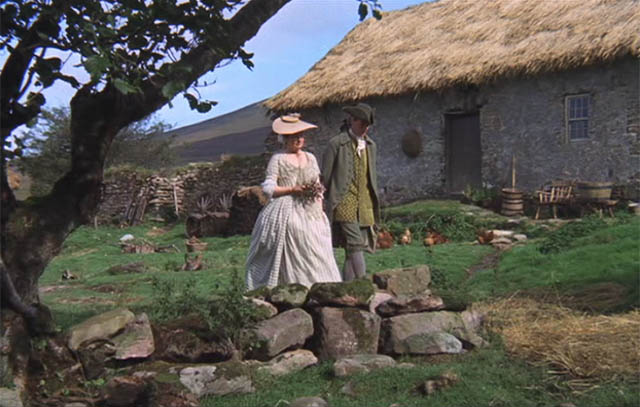

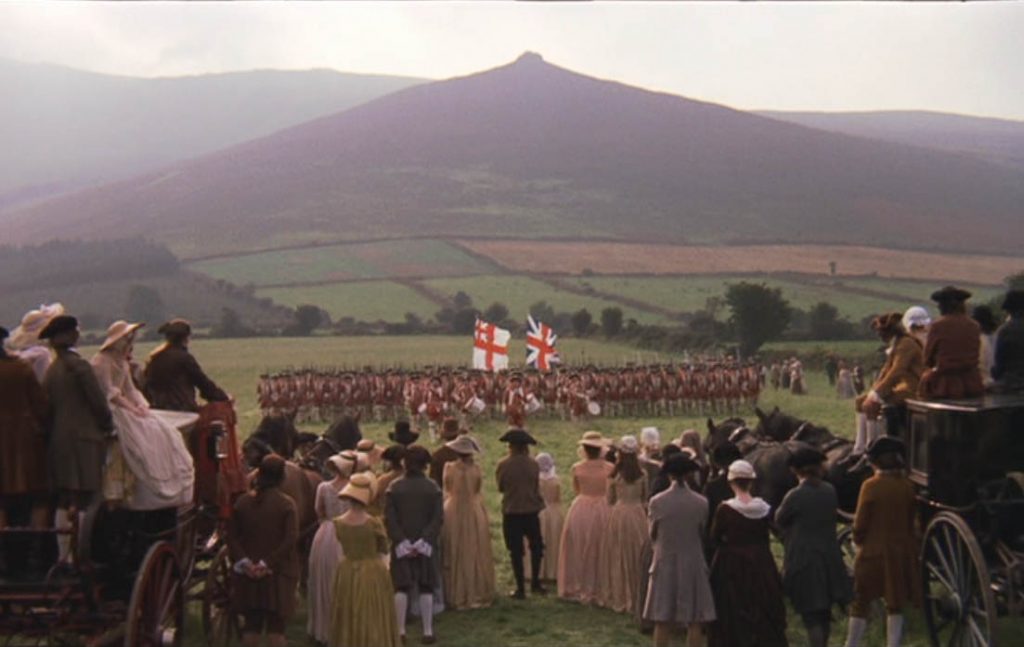

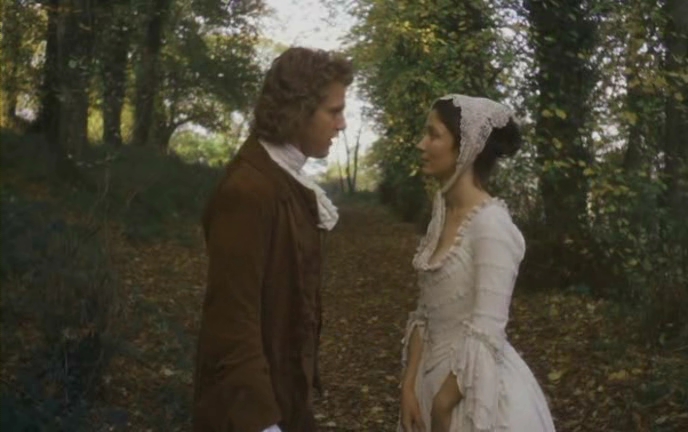


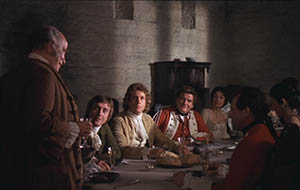
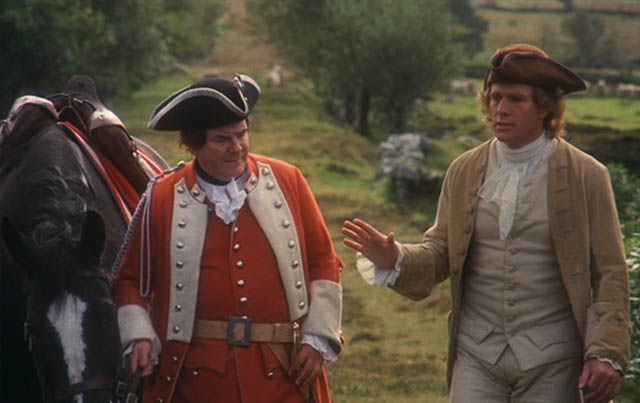
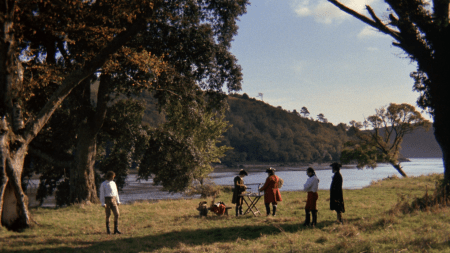
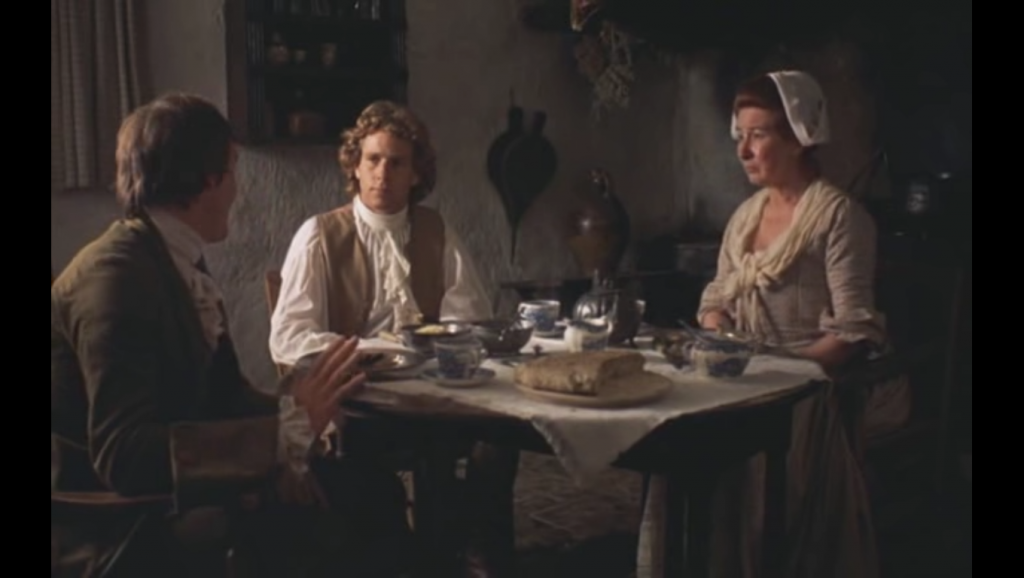
Todd, consider this a sincere thank you from at least one “absolutely no one.” Having long admired your insights,
I’m particularly pleased you’ve decided to re-tackle Barry Lyndon, a towering Kubrick achievement that has remained,
in my opinion, severely under-analyzed. Over multiple viewings, I’ve noticed a puzzling series of anomalies and themes, which hopefully you can comment on as your analysis develops. I’ll look forward to positing a few of these thoughts as you continue your excellent work.
One of the finest write ups of Barry Lyndon I’ve ever read. When I watch a period piece, my mind knows it’s a film that takes place in a certain era. With Barry Lyndon, its so hypnotic that I think I’m using a time travel device to view the past.